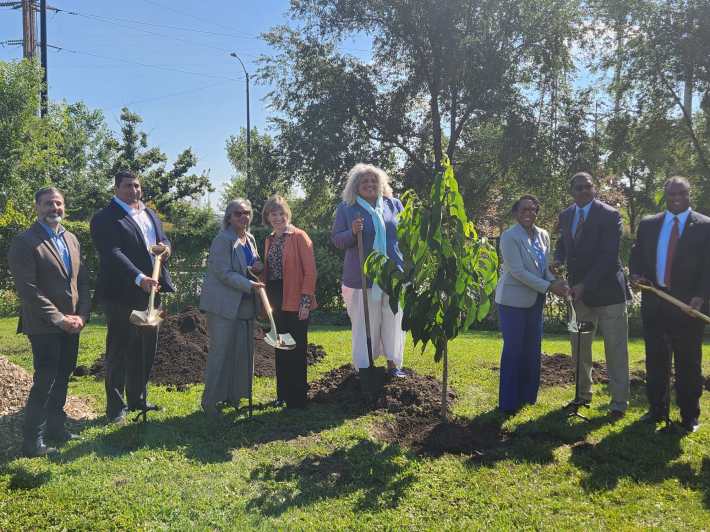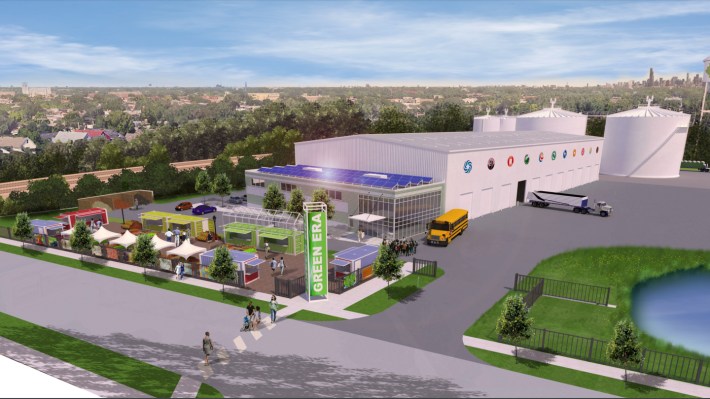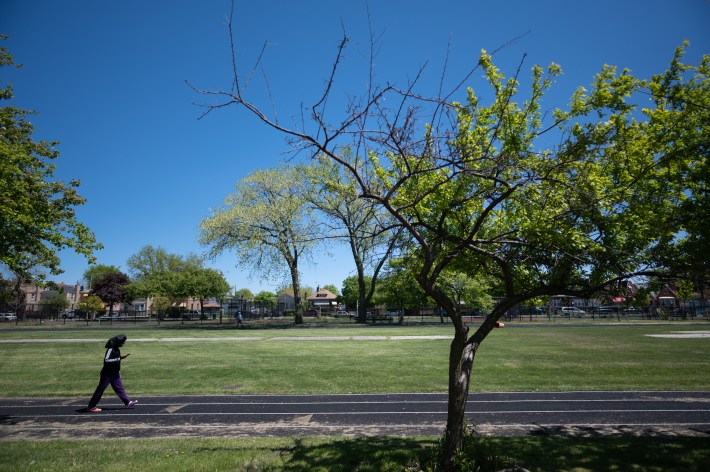AUBURN GRESHAM — A Black- and women-led nonprofit has received federal funding to continue its efforts to eradicate food and environmental injustices in communities of color across Chicago.
Urban Growers Collective was one of 385 awardees across the states, U.S. territories and tribal nations that received funding from the U.S. Department of Agriculture’s Forest Service to curb climate change and boost local access to nature.
Mayor Brandon Johnson and Sen. Dick Durbin joined community leaders on a sunny September morning at the nonprofit’s South Chicago farm, 9001 S. Mackinaw Ave., to award the group a $1 million grant.
The Urban Growers Collective will use the grant to “do more tree canopy work,” increase training and educational opportunities and build staffing capacity at its South Chicago farm and the Green Era Urban Energy Campus in Auburn Gresham, said co-founder Erika Allen. Urban Growers Collective manages eight farms over 11 acres of land in eight communities.
 Credit: Provided
Credit: ProvidedThe more than $1 billion in grant funding awarded to nearly 400 grantees is a critical piece of President Joe Biden’s Justice40 Initiative, a goal to flow 40 percent of federal climate and clean air investments to disinvested communities overburdened by pollution and the dire effects of climate change. The initiative was made possible by the Inflation Reduction Act.
With its $1 million grant, Urban Growers Collective can continue its efforts to “establish a food forest” to fight food insecurity, sequester environmental and health hazards in communities of color and build sovereignty and agency in Chicago’s neighborhoods, Allen said.
“I think growing food, herbs, flowers and understanding nature is a wonderful gateway to so many things like community building and having peace,” Allen said. “Often, we want to anchor and provide stability for our communities. We can do other things, too, to have these walkable, beautiful communities that folks can thrive in.”
 Credit: Atavia Reed/Block Club Chicago
Credit: Atavia Reed/Block Club ChicagoIn line with its mission to fight food insecurity, Urban Growers Collective will use the funding to plant more fruit trees at its South Chicago farm, Allen said.
The South Chicago farm — the nonprofit’s largest —has a “mature orchard” that began bearing fruit last year, Allen said. Farmers recently added blackberry bushes to the mix.
The farm also hosts training and volunteer opportunities for neighbors. The nonprofit will join forces with local partners, the Morton Arboretum and Faith in Place — two other federal grant winners — to expand access to training opportunities, Allen said.
“Rather than doubling our existing team, which is already overextended, [this funding] allows us to be a resource to community members and reestablish fruit and nut trees and edible plant materials,” Allen said.
 Credit: Urban Growers Collective
Credit: Urban Growers CollectiveIn Auburn Gresham, Urban Growers Collective will use the funding to expand efforts at the Green Era Urban Energy Campus, 650 W. 83rd St.
The campus, developed by Urban Growers Collective and nonprofit Green Era Partners, will transform nine acres of vacant, contaminated land into a renewable energy and urban farm development. The project won the first $10 million Chicago Prize from the Pritzker Traubert Foundation in 2020.
Urban Growers Collective will use the additional funding to plant more trees near the campus’ anaerobic digester and increase the more than 100 varieties of produce available at the 7-acre urban farm, Allen said.
“I think the fact that we’re doing this in Chicago and Auburn Gresham intentionally as a response to historic social inequity is critical at this time,” Allen said. “There’s really no other model like this.”
 Credit: Colin Boyle/Block Club Chicago
Credit: Colin Boyle/Block Club ChicagoThe nonprofit’s efforts will hopefully improve living conditions in communities that have been environmentally and economically disinvested in for decades, Allen said.
Trees have a multitude of benefits, from cleaning the air to curbing stress, improving people’s health and lowering temperatures.
Providing more trees, adding food and getting neighbors involved in the process addresses pertinent issues while giving power to long-ignored communities, Allen said.
“We’re doubling and tripling down on small loops and then creating economies that don’t extract from the environment for people and can still be profitable,” Allen said. “To model these systems, restore our environment and chip away at historical inequities is wonderful.”
Watch our “On The Block” TV show on The U, CW26 and MeTV.
Listen to “It’s All Good: A Block Club Chicago Podcast”:


![Malaria, PFAS, plus the latest from the FDA and CDC with Andrea Garcia, JD, MPH [Podcast]](https://hohmature.news/wp-content/uploads/2023/07/2018-11-19-GENERICSOCIAL-440x264.jpg)


